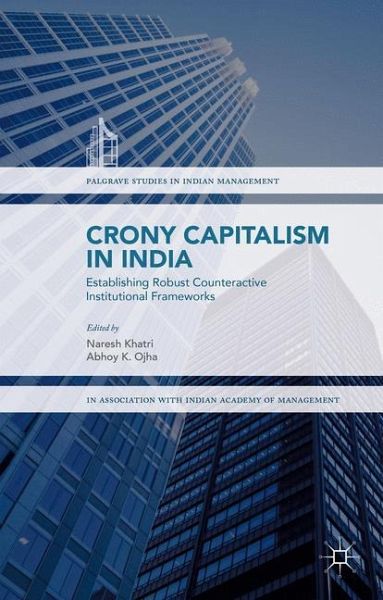
Gebundenes Buch
Crony Capitalism in India
Establishing Robust Counteractive Institutional Frameworks
Herausgegeben: Khatri, Naresh; Ojha, Abhoy
Versandkostenfrei!
Versandfertig in 6-10 Tagen
Weitere Ausgaben:

PAYBACK Punkte
38 °P sammeln!




Bringing together experts from various background, Crony Capitalism in India provides a comprehensive and scholarly examination of the important topic of crony capitalism by addressing the key underpinnings of this complex and multifarious issue.
Naresh Khatri is Associate Professor at the Department of Health Management and Informatics, University of Missouri, US. Before joining the University of Missouri, he was a faculty in the Department of Strategic Management and Organization at the Nanyang Business School, Nanyang Technological University, Singapore. Dr Khatri has authored two scholarly books and published around 60 research articles and book chapters in various peer-reviewed journals. He is also the Senior Associate Editor of South Asian Journal of Global Business Research and the Associate Editor of IIMB Management Review. He is on the Editorial Board of Health Care Management Review, Journal of Hospital Administration, and Journal of Management and Public Policy. Abhoy K Ojha is a Professor in Organizational Behaviour and Human Resources Management at the Indian Institute of Management, Bangalore, India. Prior to joining IIMB he was Assistant Professor at Laurentian University, Sudbury, Canada and workedas an engineer in the Bombay Division of the Oil and Natural Gas Commission. Abhoy has been a member of many professional bodies including the Academy of Management, Administrative Sciences Association of Canada and Indian Academy of Management, and on editorial boards of journals including IIMB Management Review and South Asian Journal of Global Business Research. He has also undertaken several consulting and training assignments in the private sector as well as in the government and public sector.
Produktdetails
- Palgrave Studies in Indian Management
- Verlag: Palgrave Macmillan / Palgrave Macmillan UK / Springer Palgrave Macmillan
- Artikelnr. des Verlages: 978-1-137-58286-7
- 1st ed. 2016
- Seitenzahl: 256
- Erscheinungstermin: 26. Februar 2016
- Englisch
- Abmessung: 222mm x 145mm x 19mm
- Gewicht: 414g
- ISBN-13: 9781137582867
- ISBN-10: 1137582863
- Artikelnr.: 43778927
Herstellerkennzeichnung
Springer-Verlag GmbH
Tiergartenstr. 17
69121 Heidelberg
ProductSafety@springernature.com
Für dieses Produkt wurde noch keine Bewertung abgegeben. Wir würden uns sehr freuen, wenn du die erste Bewertung schreibst!
Eine Bewertung schreiben
Eine Bewertung schreiben
Andere Kunden interessierten sich für











